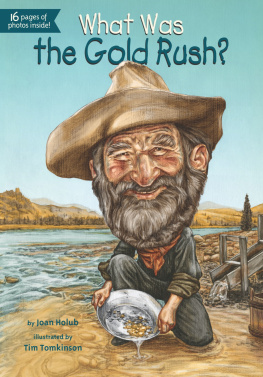Deadly Innocent
TRAGEDY ON THE TRAIL TO GOLD

Copyright Bill Gallaher 2004
All rights reserved. No part of this publication may be reproduced, stored in a retrieval system or transmitted in any form or by any meanselectronic, mechanical, audio recording or otherwisewithout the written permission of the publisher or, in the case of photocopying, a licence from Access Copyright, Toronto, Canada.
Originally published by Touch Wood Editions Ltd in 2004 with ISBN 978-1-894898-11-9.
This electronic edition was released in 2011.
e-pub ISBN: 978-1-926741-88-8
e-pdf ISBN: 978-1-926741-82-6
Cataloguing data available from Library and Archives Canada
Cover maps: Glenbow Archives NA-3351-1.
Front-cover photos: Glenbow Archives NA-483-3 (top right) and NA-949-80 (bottom).
Back-cover photo: University of Toronto Libraries P10092.

TouchWood Editions acknowledges the financial support for its publishing program from the Government of Canada through the Canada Book Fund, Canada Council for the Arts and the British Columbia Arts Council.
www.touchwoodeditions.com
CONTENTS
DEDICATION
For Ron and Barb, Phyllis, and the amazing Gallagher-Truter clan.
ACKNOWLEDGMENTS
My sincere thanks to: Vic Mazur of River Jetboat Safaris of Prince George, B.C., for a fabulous trip through the Giscome Rapids, and Brian Insko for the GPS information; the staff at Fort St. James National Historic Site of Canada for the use of their archives; the Hudsons Bay Archives; Lucy Larivire for the French translations; Marlyn Horsdal, for her diligent editorial work and patience; all the good folks at Touch Wood Editions and Heritage House; Philip Teece for his invaluable encouragement; and Jaye for always being there.
PREFACE
The gold called and they came, from the eastern part of the continent and from California where the gold-bearing creeks had petered out. They came, too, from as far away as Europe, Asia, and Down Under, along paths that were familiar and well travelled. Some sailed the Pacific Ocean, others the Atlantic, around Cape Horn or on ships connected by a well-trampled trail across the Isthmus of Panama, arduous journeys all, during which the whims of the sea, malarial jungles, cholera-stricken towns and bandits imperilled their lives daily.
Still others came by a lesser-known route: a vague trail that snaked across the vast sweep of the Canadian prairies where the capricious weather sucked the desolate landscape dry one day and offered up floods of biblical proportions the next; a land gouged by myriad rivers and plagued by insects enough to drive both humans and animals insane. And that was the easy part. Beyond were the mountains: the Rockies, so enormous that they were visible more than a hundred miles away, and beyond them, a tapestry of ranges of rugged peaks and thickly forested hills that repeated itself for hundreds of miles before ending abruptly at the Pacific Ocean. Near the end of this vast mosaic was the place of their dreams, a place called Cariboo, and only with great perseverance did hundreds of sturdy souls actually reach it.
Some did not.
PROLOGUE
CHRISTMAS DAY 1862
The snow fell in plump, soft flakes, piling up on the split-rail fence lining the pathway to the clapboard house and draping the trees in the yard. It settled on the gentle slope of the porch roof and, higher up, on the more steeply pitched main roof where smoke climbed lazily from a stone chimney. Webs of frost edged the windows through which the pale light of oil lamps gleamed in the early morning darkness.
She stoked the fire that she had been up twice during the night to feed, coaxing a burst of flames from it, and then added more wood from the box beside the stove. Now that she was up for good, she opened the damper a bit more. The seasoned wood caught fire quickly, sending forth a welcome wave of heat around her face. It made her think of her boys, so far away from hearth and home, and she whispered a small prayer that they were also warm and that no harm had come to them. The last she had heard from them was a letter from Fort Edmonton that had arrived in November. She had opened it with much trepidation, and felt weak with relief when she read that they were all fine. However, the date of the letter, August 29, meant that their journey was taking much longer than they had expected. Now, here it was Christmas and she had heard nothing further. They had written of the mountains awaiting them, which had caused her much anxiety, and for many nights afterward she prayed that they had managed to pass through them safely. Surely, they would have by now. She thought about them constantly, her three sons, her flesh and blood, and lamented the unbridgeable chasm of months and miles they had left behind with their departure.
He lay there fully awake, listening to the strangled sounds of the river as the ice slowly choked the life out of it. God, how he hated this awful place, hated the cold and gnawing hunger. Even hated the men who slept beside him, one a next-to-useless invalid, the other so antagonistic. Were they asleep? Or were they awake, one of them silently plotting his demise? He would have to be vigilant just in case: stay awake, until he heard the telltale snoring. Then he would make his move.
Closing the stove door, she rubbed her hands together. A busy day loomed ahead. Company was coming for Christmas dinner: Her daughter-in-law, Mary, and grandson, Lucas, would be here, as well as Mrs. Wright, who was bringing her two daughters. Mrs. Helstone would be coming on her own, since her three children were grown up and gone and her husband was away west himself. She checked her image in a small mirror hanging on the wall and saw a rather severe-looking face staring back. Her looks had always disappointed her because she rarely felt severe inside. And lately, grey hair seemed to be sprouting like weeds.
It was a good idea to keep busy, and the Lord knew that she had more than enough to do since the boys had left. She would need to warm the house up by getting a good blaze going in the open-hearth fireplace at the far end of the kitchen. This would supplement the heat from the kitchen stove, which was inadequate by itself to heat the main floor, its primary use being for cooking and keeping the chill out of the house overnight. She went outside to the front porch and took a small armload of wood from the pile neatly stacked against the wall. It took four trips to fill up the hearth box, and she wished for a moment that the boys were here because one of them would have done it in two. Then she chastised herself for the thought. She was fully capable of making four trips: even more, if necessary.
A small rumbling in her belly demanded breakfast but she ignored it. She derived no satisfaction whatsoever from cooking for herself, so she usually nibbled in the kitchen now and then during the day. Nevertheless, tea was indispensable, and perhaps a slice of bread and preserves to see her through the morning, with all the work she had to do. She threw a couple of measures of leaves into a teapot and filled it from the kettle on the stove, then, at the counter, carved off a heel of bread with the new slicer William had bought her before he left. It was an unwieldy thing that worked a bit like a guillotine, and to tell the truth, she still preferred a sharp knife. A gift from a thoughtful son, though, did not deserve to be hidden away unused in a cupboard.












